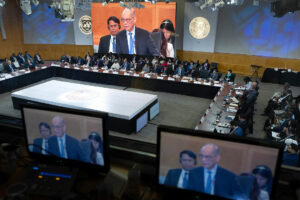




Philippines Trade Update: Imports weaken on tepid demand
 DOWNLOAD
DOWNLOAD

Policy Rate Updates: BSP outlook — cloudy with a chance of rate cut
 DOWNLOAD
DOWNLOAD

January Economic Update: Growth slows, prices rise
 DOWNLOAD
DOWNLOAD


Multilateral banks urged to boost climate investments

WASHINGTON — Finance Secretary Benjamin E. Diokno on Tuesday called on multilateral development banks (MDBs) to boost climate investments by expanding private sector participation.
In his speech at the 2023 Intergovernmental Group of Twenty-Four (G24) ministerial meeting in Washington D.C., Mr. Diokno said the role of the World Bank (WB) and the International Monetary Fund (IMF) in supporting countries, especially emerging markets, is crucial in addressing multiple global crises.
“The polycrisis we’re facing threatens to reverse the years of progress we’ve made towards poverty reduction and shared prosperity. Together, we must be decisive in tackling these challenges,” he said.
Mr. Diokno is the First Vice-Chair of the G24 Bureau and the WB Governor for the Philippines. The G24 coordinates the position of developing countries on monetary and development issues in the deliberations of the Bretton Woods institutions such as the World Bank Group (WBG) and the IMF.
Mr. Diokno identified four areas that need to be addressed — inflation, climate, international tax reform, and ongoing reforms to the Bretton Woods institutions.
He told G24 member countries that the Philippine government has been aggressive in fighting inflation, which remains elevated due to high food and energy prices.
The country’s headline inflation eased for a second time in March to 7.6%, marking the slowest pace of price increase in six months. Inflation averaged 8.3% for the first quarter.
Mr. Diokno also said that countries must urgently respond to the climate crisis.
“This is clearly one of the biggest adversaries of development. When disaster strikes, climate-vulnerable countries such as the Philippines stand to lose the most,” he said.
The Finance secretary also noted the role of international tax reform and domestic resource mobilization in driving sustainable and inclusive growth.
“[W]e fully support the continued efforts of the G24 Tax Working Group to promote peer dialogue and cooperation on key tax challenges,” he said.
Mr. Diokno also noted that ongoing reforms to Bretton Woods institutions through the WBG Evolution Roadmap and the IMF 16th General Review of Quotas allows countries to reinvigorate the multilateral system.
He said that the proposed reforms to the bank’s financial and operating models should not negatively affect International Bank for Reconstruction and Development borrowers like the Philippines.
As for the IMF 16th General Review of Quotas, Mr. Diokno said boosting the voice and quota of emerging markets and developing economies at the IMF should be considered due to their growing share in the world economy.
“[W]e look forward to continued discussions on these efforts that will arm the World Bank and the IMF to better support economies against future shocks,” he added. — By Keisha B. Ta-asan
This article originally appeared on bworldonline.com





 By BusinessWorld
By BusinessWorld